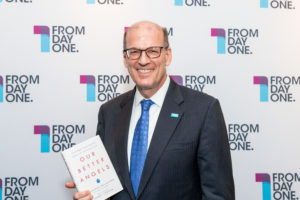The Abundant Virtues of Building Homes Together


Habitat for Humanity is an organization that helps families build homes, as well as improve them. But it has been building something else as well: the size and scope of its own ambition.
Habitat helped about 125,000 people in 2005, which grew to about 7 million in 2019, according to the company’s CEO, who attributes the growth to Habitat’s partnerships with businesses and other organizations.
“In some ways our model turned inside out,” said Habitat CEO Jonathan Reckford. “Rather than thinking we can build our way out, we wanted to be a partner and catalyst for worldwide access to safe, decent and affordable housing,” he said in a panel discussion at a recent From Day One conference in Atlanta, where he was joined by executives from partner companies Delta Air Lines and Levelor.
Reckford said the key to picking a partner is to anchor the partnership in the mission of the company in a way that authentically engages employees and customers, as well as advancing the company’s strategic goals. “And don’t pigeonhole it in one area, so it shouldn’t only be in HR,” he said. The partnership has to be owned by a company’s senior leadership if it’s going to be embedded in the culture, he added.
Tim Mapes, Delta’s chief marketing and communications officer, said the interest in philanthropic causes is so great among the company’s employees that management uses a bidding process for the 90,000 employees who want to get involved.

“We’ll build 15 homes this year, eight outside the U.S., seven in the U.S. We’ve built 273 homes over our time, and the reason the numbers keep growing is because our employees want to do more,” he said. Delta has even focused on its Habitat partnership in one of its latest safety videos.
Levolor, the maker of window shades and blinds, recently partnered with Habitat and promised to donate $1 million worth of cordless blinds and shades to Habitat homes across the U.S.
“Our company was looking for a philanthropic endeavor and it started more as an observation that we weren’t really active in the community,” said Levelor President Christian Leard. “So it started small, with things that were important to me and I found to be important to some of my staff.”
The partnership with Habitat is attractive because it combines the company’s product, its purpose, and the “right level of philanthropy.” It also allows employees who are involved in the product’s installation to “really get their arms around” the company’s purpose, he said.
“That’s the part where the employees actually feel involved when they’re out there at the house. It’s not just the product for us, it’s the being together with the community and our partners,” Leard said.
The need to pursue more than just profits and career advancement is especially important to younger workers, Reckford observed. “I hear a lot of mixed things about millennials, but this is the most globally connected and compassionate generation I think we’ve ever had in terms of care,” he said. “I do think they’re also setting a much higher bar than maybe any generation. I’m expecting that wherever they work will be authentically committed to making their communities better.”
Reckford said data overwhelmingly shows that the best talent wants to work for companies that are value-driven and live that out in a tangible way in the communities they serve, which is something customers also want to see.

Being clear on those values also allows companies to make quick decisions and boldly execute them, Mapes said. “If you’re unclear, obviously it’s much more difficult to make decisions in a timely manner. And for us, as an airline where our planes are going 525 mph, speed matters,” Mapes said.
Such clear values may help illuminate the organization’s direction, he said, which includes a major commitment to sustainability. In February, Delta announced that it was committing $1 billion over the next decade toward becoming carbon neutral.
“Increasingly young people are of the belief that with [environmental activist] Greta [Thunberg] and other people like Greta that you’ve got to make a decision between travel and protecting the planet,” he said. “That is not a decision we want any customer anywhere, anytime, to be forced to make.”
“We need to solve this problem for customers such that the people who want to travel to see the world and experience other cultures and become sensitive and empathetic toward others can do that without in any way harming our planet,” said Mapes. “And that’s a responsibility we have, not that our customers have, that we have.”
Alissa Smith is an Atlanta-based copywriter and journalist. She has spent the past five years working at news outlets including the Associated Press and the Orlando Sentinel.
The From Day One Newsletter is a monthly roundup of articles, features, and editorials on innovative ways for companies to forge stronger relationships with their employees, customers, and communities.